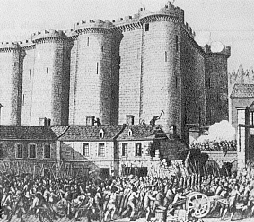
Fall of the Bastille (July 14, 1789)
On July 14 the event occurred that, more than any other, has symbolized the French Revolution - the storming of the Bastille. Incited by rumors that the king had ordered troops to Paris to disperse the National Assembly, a Paris mob surrounded the Bastille hoping to secure weapons and demanding the removal of some cannon the governor of the prison had placed facing outward. The crowd got out of hand, fighting began, and soon the prison was in the hands of the mob. The governor of the prison was murdered as was the mayor of Paris. Their heads were mounted on pikes and paraded through the city. When the Duke de La Rochefoucauld-Liancourt told King Louis XVI about the storming of the Bastille, the king angrily exclaimed, "This is a revolt!" "No sire," replied the duke, "it is a revolution."

Fall of the Bastille (July 14, 1789)
The Great Fear
In late July, serious unrest
called the "Great Fear" broke out in rural areas. Rumors reported an impending
famine and told of bandits, in the pay of the nobles, roaming the countryside
attacking peasants. Driven by fear and anger, the peasants armed themselves
and prepared the fight the ruthless bandits. In addition, the peasants
attacked many manor houses, often hoping to destroy the records of dues
and services owned the lord. News of these disorders alarmed many of the
delegates in the National Assembly.
Previous
page
Next
page